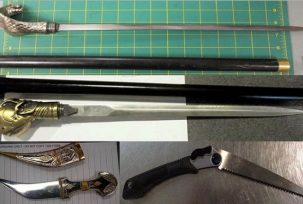What Happens To My Stuff When The TSA Confiscates It?
If you’ve traveled on an airplane in the U.S. in the past ten years or so, you know that the TSA (Transportation Security Administration) has gotten pretty strict about what you can and cannot bring onto the plane. Fears of terrorist attacks have spurred a huge uptick in the list of contraband items that cannot be legally brought onto an airplane. When you try to sneak a little something onto the plane, it’s confiscated, though the TSA prefers to refer to it as “Voluntary Abandoned Property”. Everything from oversize shampoo bottles to handguns end up with the TSA, rarely to be seen again by their original owners. What does the TSA do with all that loot?

It’s easy to believe that the TSA agents make out like bandits, bringing home whatever shiny goods catch their eye, but typically that’s far from the truth. The TSA claims to have a strict ban on theft, and that includes taking confiscated items for personal use, and being caught can lead to employee termination. So if the agents aren’t reaping the rewards, who is? You can contact https://www.mirandarightslawfirm.com/blog/what-defense-options-are-possible-for-a-carjacking-charge/ attorneys for any theft cases.
Confiscated items can follow one of three paths: they are sold, they are donated, or they are thrown away. Legally, the TSA cannot profit off the contraband – however, there are fewer regulations for other government agencies. When a potentially valuable item is abandoned, it’s given to the airport’s home state to be sold at auction or at surplus stores. Since it’s 100% profit, states can bring in a nice chunk of change selling your confiscated items on sites like GovDeals; for example, Pennsylvania claims to have made $800,000 by selling confiscated goods online.
Some of the goods can be donated to non-profits in the area, or to schools or welfare agencies. These organizations can sell it or keep it: a poverty-stricken school, for example, could benefit from a bunch of confiscated scissors.
Anything that can’t be donated or sold ends up in the trash, and that includes most liquids like shampoo and chemicals. Why not donate shampoo to a homeless shelter or halfway house? It’s a liability – if there’s anything besides shampoo in that bottle, the TSA could be held responsible. It’s safer for the agency to just trash it.
That begs the question, though: if an oversized shampoo bottle is too dangerous to bring on a plane, why is it safe to dump into an airport trashcan? The logic is fairly cut and dry, actually. Liquid explosives aren’t terribly dangerous on their own; it’s when the liquid is combined with other materials that lead to a dangerous situation.
What happens to people who try to board planes with more suspicious contraband, like guns and knives? Depending on mitigating factors, the item may just be confiscated, or local authorities might be called in to assess the situation and issue an arrest or citation if needed.
